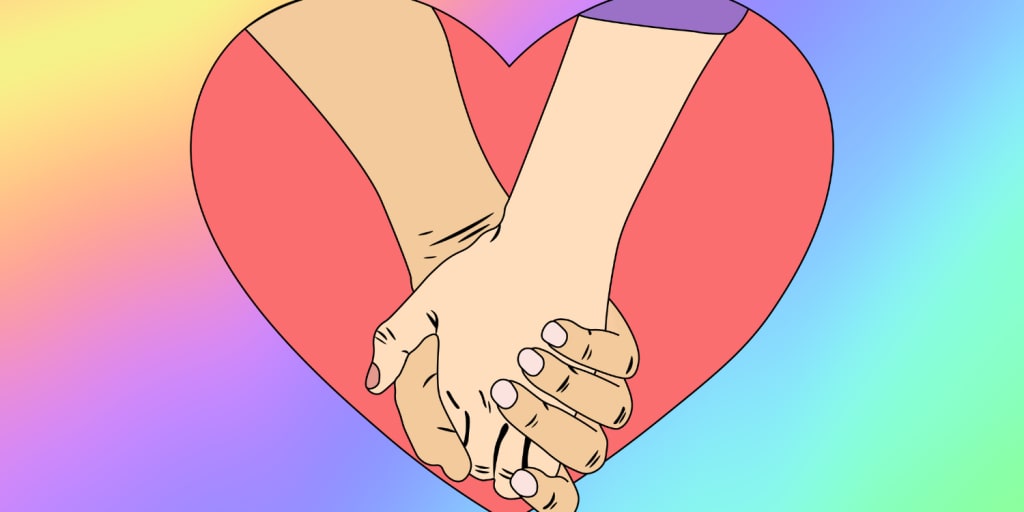Why Everyone Complains About Your Lack Of Compassion
And how to re-adjust your mindset to regain your compassion for others.

So you might be one of those people who everyone says "doesn't care".
You don't care about anyone but yourself. You don't care when the rest of the world does. You don't care when you should.
I have a list of people from my life who fit this description.
You would swear they don't know other people exist because their severe lack of compassion for everyone else's suffering doesn't exist.
It's one thing to know these people in your life. And it's another to be that person in other people's lives. And, even worse, to not know it. Or, as for some, to not care, either.
Many of you out there have had, what I've come to learn as, a compassionectomy. It's a term used by my beloved husband to describe those who have gone through events in their life and come out the other side without:
- Empathy for others
- Sympathy for others
- An ability to give any caring for a situation they don't believe is important enough for them to care about.
It's almost as if the magical caring fairy has dug into your brain and removed the part of you that allows caring like they once did.
Here's the thing; you haven't always been like this. Something happened to stop you from caring. And everyone can see it, but you.
Here are those events that led you to lose your ability to share any compassion for others.
The abundance of people who cried wolf in your life
I get it; when someone cries wolf all the time, it's difficult to feel sympathy for them.
They're liars, essentially.
They are always spouting something that doesn't end up being true.
And there is the attention that comes with crying wolf. Don't get me started on the issues surrounding someone who has to do this feel noticed. That's for another day.
Losing compassion for the wolf criers happens easily. They drain your sympathy, sucking you into their emotional melodrama that ends up being nothing at all.
How to reverse your compassionectomy:
- Remember not everyone is the same - You might have one wolf crier in your life, and that sours your experience with everyone. You're smart enough to know everyone is different and not everyone you will ever meet will do this to you.
- Focus on the times when people haven't cried wolf - Actively remember the times people in your life have sought compassion genuinely. Focus on those people. Focus on those times. Turn your attention away from the wolves.
- Surround yourself with sheep - If you're finding you have a lot of wolves in your life, find some sheep (the opposite). Surround yourself with people who don't use this tactic to manipulate you. And embrace the genuine moments with them.
- Apologise to anyone you assume has cried wolf - Part of dealing with a compassionectomy reversal is apologising to those who you have assumed cried wolf. But haven't. It shows you care. It helps you understand the power of what happens when you don't care when you should, too.
Professionally trained to hold back your compassion
Many people won't tell you how lacking in compassion you are, especially when caring is what you do for a living.
As any type of carer (nurse, doctor, therapist etc), you are surrounded by people's pain every single day. To do your job effectively, packing some of your compassion away is necessary.
Take a look at first responders. What would happen if they were overcome with compassion in every situation?
Would they be able to save lives?
Or would their emotions overcome their logic, rendering them almost useless in this situation?
Now I'm not saying you don't care, or anyone in these types of professions doesn't care. Of course, you care; that's why you do your job.
But sometimes people in these positions are unable to separate work and personal. They confuse the suffering of their loved ones with the suffering of the people they care for, in their job.
This can result in (a small handful as an example):
- A lack of outward emotion when someone passes away.
- A lack of concern when someone declares they are ill, have a serious disease, injury etc.
- A lack of compassion for people struggling with their life for reasons out of their control.
These reactions result in others thinking you don't care in situations most people, or you specifically, should care about.
Without 'shoulding' you, there is a social expectation that you at least seem like you care to the people who care about you.
How to reverse your compassionectomy:
- Quit your job - Whilst being a good doctor/nurse/medic/etc is what you have wanted to do, perhaps now you are your job. And you've crossed the line where you aren't an effective friend, partner or parent to the people in your life. A career change isn't the worst thing if you value relationships over your career.
- Move into another area of your job - Sometimes front-line work can take a toll on you more than you know. Try moving into a role that's less grief-facing and perhaps more operational. Look for a situation where you work with staff rather than patients.
- Wake up to your behaviour - You might have compassion but because of your job, you don't show it. Or you no longer know how to show it. This is when you need to evaluate your behaviours. Work out whether your inability to emote your feelings is causing more harm than good.
Learned to care less to save yourself
As someone who's suffered abuse from my childhood, I can understand compassionectomies stemming from trauma.
When you've undergone true, mentally-altering trauma, other people's problems can seem trivial. You can see the issues that plague them as:
- Nothing compared to what you suffer - "I've had it worse than you"
- Nothing compared to real-world problems - "Your problems don't compare to the people starving in third world countries"
- Nothing compared to what it could be - "Consider yourself lucky it's not worse"
Perhaps these unhelpful thought processes are true, too. Perhaps it could be worse, or their situation isn't that bad in the grand scheme of things.
That's the problem with trauma; we view situations with a lack of compassion.
And a hypocritical view, too. If we reversed the situation, this dismissive analysis of our situation would break our hearts.
But these thought processes aren't going to help us build meaningful relationships with other people. Nor will it help us overcome our trauma or handle the eventual times when things don't go the way we want them to.
How to reverse your compassionectomy:
- Acknowledge everyone is suffering - I hate being the bearer of bad news, but you're not special. I'm not special either. No one is. Everyone is going through something, even if the facade says otherwise. And even if it's not "that bad", it's bad to them.
- Acknowledge this isn't a competition - It's not your suffering versus theirs. Or anyone else's. The longer you make it a competition, the more someone has to win. And the more steadfast you are in your suffering, the more the winner has to be you.
But I haven't had a compassionectomy?
There are going to be a few of you out there thinking you have compassion, you simply choose not to show it.
Or you don't like humans, zero compassion exists and that's just you.
Whilst I'm not one to argue with the way you want to live your life, you weren't born without the ability to care. Somewhere along the line, something happened in your life where:
- You were taught to care and then lost the ability to
- You weren't taught to care at all during your formative years
And caring, fundamentally, is one of those things that brings people together, helps forge relationships and helps you grow as a person.
Sure, you can live without it. But don't expect other people to care about you if you can't care about them.
Compassion is a two-way street. Care about it.
About the Creator
Ellen "Jelly" McRae
I’m here to use my wins and losses in #relationships as your cautionary tale | Writes 1LD; Cautionary tale #romance fiction | http://www.ellenjellymcrae.com/






Comments
There are no comments for this story
Be the first to respond and start the conversation.